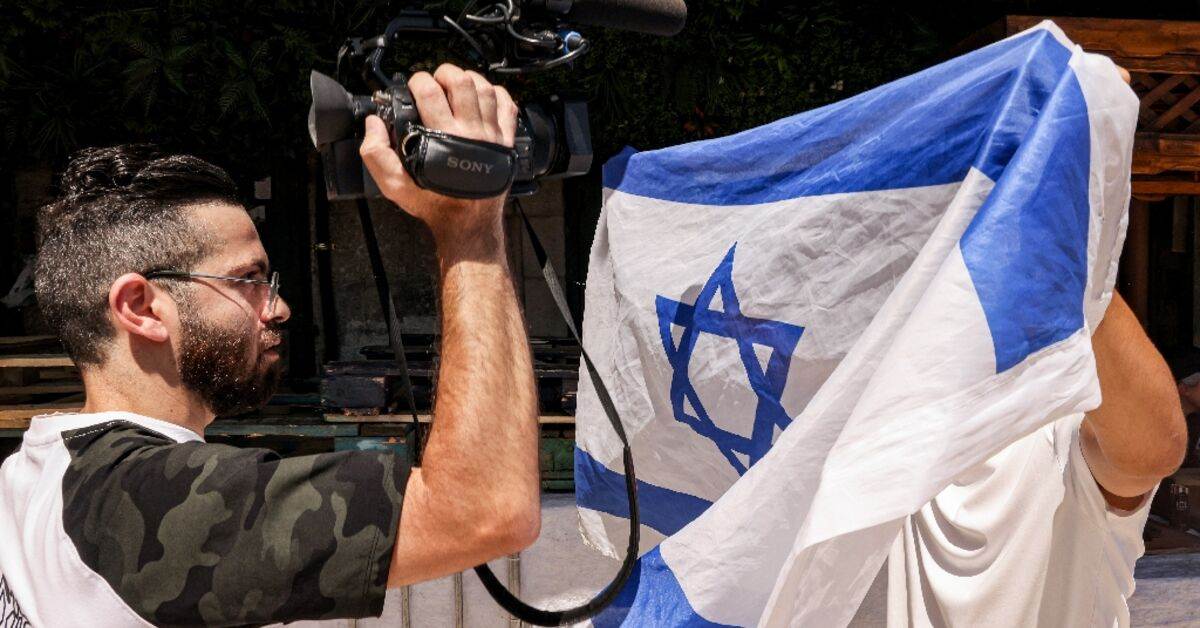Top Stories Tamfitronics
Since war began in Gaza on October 7, Israel’s military campaign has received rolling coverage on domestic television, with just one notable aspect missing — the Palestinians living, and dying, under the bombs.
Every night during prime time, Israeli viewers hear about military operations in the Gaza Strip, now ravaged by the ongoing retaliation for Hamas’s unprecedented attack on Israel on October 7.
The deadly attack “was a surprise for Israeli society, and media gave full priority to Israel’s suffering and trauma, which is still present,” Jerome Bourdon, a media sociologist and professor at Tel Aviv University, told AFP.
Israel has four main news channels.
There is Channel 11, the main channel of the public broadcaster; Channel 12, “the most watched”; Channel 13, “the most critical” of the government; and Channel 14, “Prime Minister Benjamin Netanyahu’s propaganda tool, Israel’s Fox News”summarised Oren Persico, a journalist for “The Seventh Eye”an Israeli news website focused on the media.
After analysing many hours of news, satire and talent shows, “The Seventh Eye” earlier this month delivered its verdict: “Media in Israel, from Channel 11 to 14, do not show images of human suffering in Gaza.”
Television viewers see “images of rubble, of a bombarded building, but not individual stories of people concerned”the website said.
– ‘A different angle’ –
The pattern is not exactly new, Bourdon said, as Palestinian voices were “made invisible” even before October 7.
The attack that day by Palestinian Islamist movement Hamas resulted in the deaths of 1,205 people on the Israeli side, most of them civilians, according to an AFP tally based on Israeli official figures.
Israel’s retaliatory military campaign in Gaza has killed at least 41,467 Palestinians, the majority of them civilians, according to data provided by the health ministry in Hamas-run Gaza.
The United Nations has acknowledged the ministry’s figures as reliable, but they are “not used by Israeli media”Persico said.
The exception is ultra-conservative Channel 14, which mentions “40,000 terrorists eliminated” in chyrons and on its website.
In an interview with AFP, one of Channel 14’s journalists, Hallel Bitton-Rosen, said its news coverage focuses on “support for fighting forces that protect the country and citizens against vile terrorists that perpetrated the terrible massacre” last year.
The Israeli army says 348 soldiers have been killed during operations in Gaza since the beginning of the ground offensive on October 27.
When Israeli TV channels do dedicate segments to Palestinians, there is “a different angle compared to foreign media”Bourdon said, pointing in particular to settler attacks on villages in the occupied West Bank, where violence has soared since October 7.
Israeli journalists tend to favour the line that “the army failed to stop the settlers” rather than “couldn’t protect Palestinians”he said.
– Legitimate torture? –
In late July, Israeli soldiers were arrested and questioned by military police on suspicion of sexually assaulting a Palestinian detainee after a prison surveillance video was leaked to media.
Israel’s most important military backer, the United States, said at the time that “reports of sexual abuse of detainees are horrific” and called for perpetrators to be held accountable.
On Channel 12, however, debate raged over whether torturing and even sodomising “terrorists” could be considered “legitimate”.
Inside Channel 12’s newsroom in Tel Aviv, there was “a before and after October 7″said a popular reporter who wished to remain anonymous.
“The focus is on the horror that struck us, not on Palestinian stories,” he said.
Several journalists AFP spoke to said they have not faced editorial pressure to cover the war a certain way.
Instead they said the dearth of attention allotted to Gaza’s civilian inhabitants could be explained by lingering shock from October 7 and a widespread belief that Palestinian sources cannot be trusted.
They contended it was international media who covered the war unfairly, with a clear bias in favour of Palestinians.
Israel’s media landscape is not monolithic, however.
The left-leaning Israeli daily Haaretz and the online news site +972 are among the few outlets producing investigations on Gaza.
They have examined, for example, alleged torture of civilians by Israeli soldiers and the use of artificial intelligence to identify strike targets.
Bourdon noted, though, that these outlets’ audiences are limited to a “minority” on the “intellectual left” in the country.



